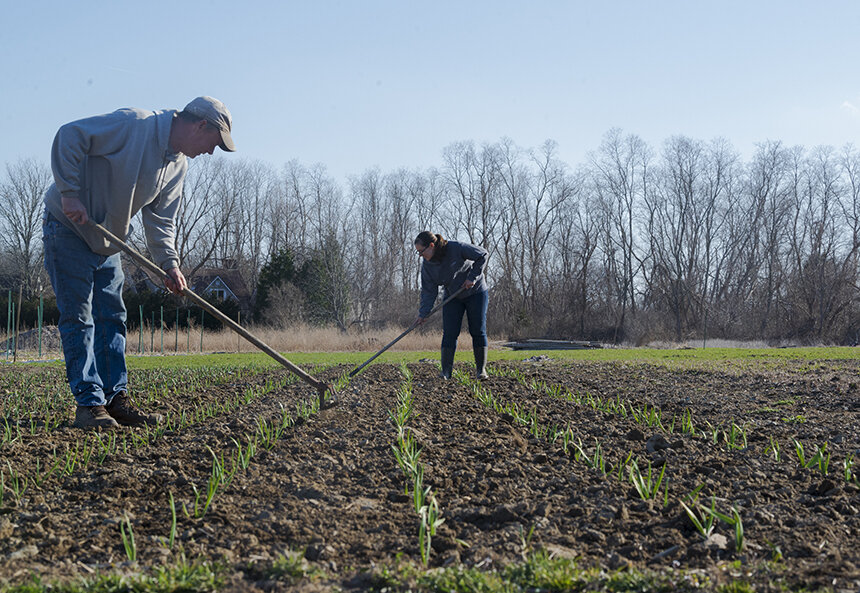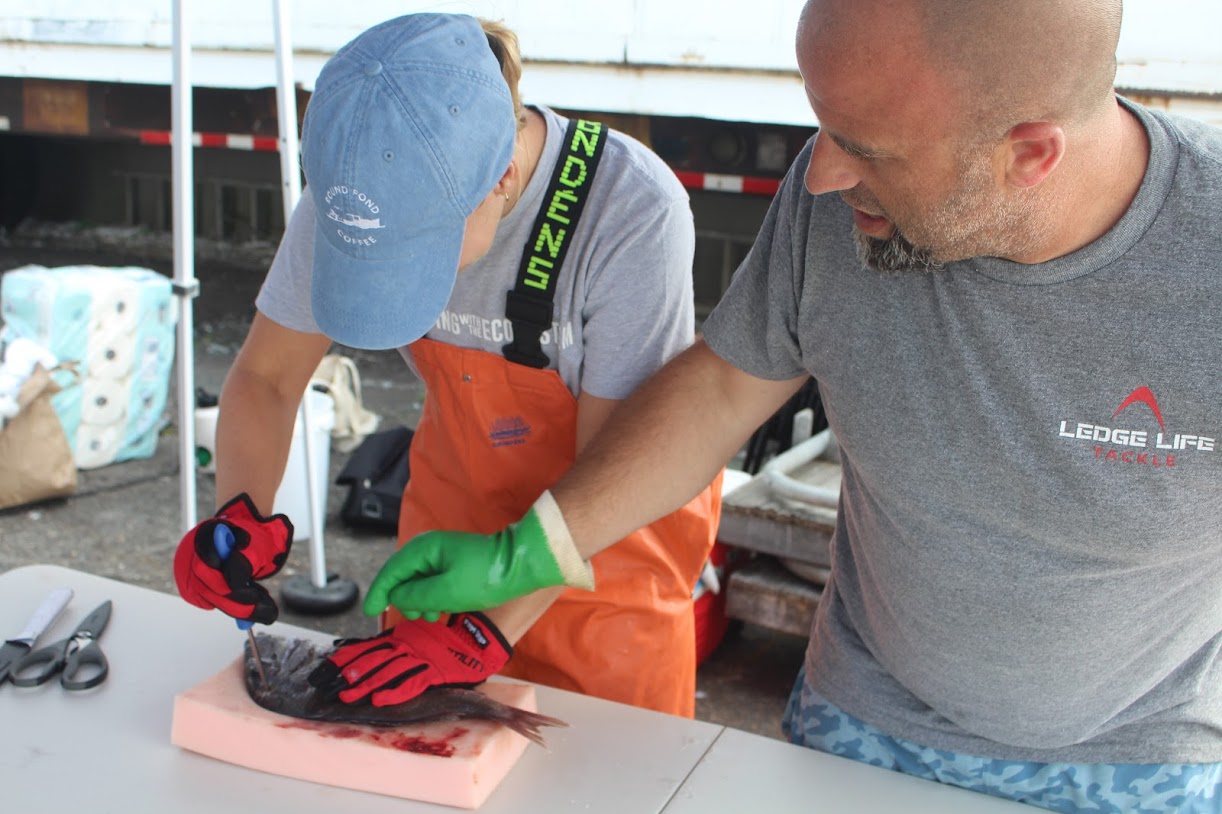Rhode Island Food Systems Rally in Time of Crisis
While runs on the supermarket have become seemingly commonplace during the coronavirus crisis, the fate of our globalized food system is up in the air. But one thing is certain: local food systems will be more important than ever.
March 25, 2020
Food systems are complex networks that connect everyone: the wealthy, the poor, restaurants, grocery stores, fishermen, and farmers.
“Food is a fundamental need that everyone has to have access to,” said Eva Agudelo, founder of Pawtucket, R.I.-based Hope’s Harvest, a service that collects the leftover produce from local farmers’ fields and donates it to food banks. “And in an emergency, like coronavirus, making sure that people have food is essential.”
Cue the empty shelves and the panic-induced food hoarding. Heck, cue my packed freezer.
“I ordered food from a grocery store to be delivered, and I selected one kind of mushroom, and I was brought a different kind,” said Nessa Richman, network director of the Rhode Island Food Policy Council. “I assume this was because the kind I wanted was out of stock. Meanwhile, maybe I could’ve ordered local mushrooms of the exact sort I wanted from Market Mobile and had them delivered to my door.”
The coronavirus pandemic has demonstrated the importance of local food systems that, unlike global and national food-supply chains, are nimbler than their large-scale counterparts, and can adapt quickly to disasters.
“The fact is, we have a national and global food system and, whether it’s from a virus or another disaster, that food system is going to be interrupted and disrupted more as we move into the future,” Richman said. “And what that means is that the more robust local and regional food system we can develop, the more secure and safe and healthy our food supply will be.”
While panic-shopping has depleted supermarket stocks, the pandemic has also highlighted both the plight and importance of local farmers and fisheries, and has shed a light on the sharp divide in food equity and access that is right under our noses.
Each month, according to the Rhode Island Food Bank, more than 53,000 Rhode Islanders receive food assistance.
“The Rhode Island Food Bank is an incredibly well-oiled machine and they are really on top of staying in touch with people and doing this level of emergency response,” Agudelo said. “They really get it. They get that we need to make sure that people are fed.”
According to the organization’s website, “in response to the COVID-19 crisis, the Food Bank has made some adjustments to our operations, but we continue to deliver food through our statewide network of member agencies.”
While volunteer shifts have been suspended for the next two weeks, the organization noted that, “Our top priority is to ensure that our network of pantries remains strong and able to distribute healthy, nutritious food to those who need it most.”
The coronavirus pandemic has revealed that the move toward local isn’t just a trend used to market “farm-to-table” food at fine-dining establishments. As Richman noted, it’s essential, and according to US Farm Data, small farms are popping up across the country at a rapid clip, with about 670,000 farmers managing small-acreage farms vs. the 46,000 farmers managing large farms.
But it’s not easy being a small-scale farmer, with the U.S. Department of Agriculture reporting that 50 percent of all farms, big and small, have less than $10,000 in sales. (Plus, Rhode Island has some of the highest farmland prices in the country.)
Add a pandemic to the mix, and the smallest farms with the slimmest margins can see their entire market — i.e., steady wholesale purchased by restaurants — completely wiped out.
“My biggest concern are those small farms that rely heavily on wholesale clients as restaurants shut down across the state,” said Katie Steere, from Deep Roots Farm in North Scituate, which sells pastured meat and eggs. “While I know we’re all working hard to pivot, it can’t be easy to see your sales channels disappear overnight.”
And it’s not just farms feeling the hit. According to Richman, oyster farming is one industry that’s also being walloped by the coronavirus pandemic.
“They’re probably down to close to zero income at this point,” she said. “They really, really depend on the restaurant business to sell their oysters.”
Kate Masury, program director for Eating with the Ecosystem, noted that the local fishing industry was feeling the reverberations from COVID-19 long before the virus hit the United States.
“Most of our international markets are being impacted,” she said. “We sell a lot of seafood over to Asia, so that’s obviously not happening at the moment — the demand from China has been closed off for a while. So those are some major markets that got cut off, so we’ve been feeling those impacts, and then we felt it from Europe and other places.”
Then, U.S. restaurants shuttered, and the lifeline for many fishermen was totally severed.
“With restaurants closing down here in Rhode Island, in the U.S., that’s had a huge impact as well, because that’s where a lot of our seafood goes,” Masury said. “In this country 80 percent of seafood we eat as consumers is consumed at restaurants.”
She said that many fishermen have either stopped fishing, taking a huge financial hit, or continue to sell to any fish markets that remain open, like Andrade’s Catch in Bristol, which has made its mission clear during this tough time: continue to support local shellfishermen and quahoggers.
“We’re trying our absolute best to take care of our loyal quahoggers. With restaurants being limited to take-out, our wholesale operations have come to a sharp halt. That has impacted our ability to support out local fishermen,” the company wrote in an Instagram post. “So, in an effort to keep them fishing and keep us buying from them, we’re running a little deal.”
The Bristol fish market goes on to describe a sale on littleneck clams, and continues to post various deals on all kinds of frutti di mare.
But while many farmers and fishermen are struggling to adjust, there is some light at the end of the pandemic tunnel.
To help farms and fisheries that rely on wholesale, Farm Fresh Rhode Island, which normally delivers produce orders for restaurant clients from a variety of local farms, opened up its Market Mobile service to the public.
“This is something we’ve never done before, but we are trying to respond quickly to the needs of local farmers (and eaters),” Rebecca Seggel, Farm Fresh’s communications director, said.
And so far, the consumer response has been huge.
“We received 525 new accounts in the span of 24 hours, and that is still growing,” said Nikki Ayres, sales manager for Market Mobile. “These past two order cycles have had more stops that we ever have had on a route.”
For Adam Graffunder of Foggy Notion Farm in Johnston, Market Mobile opening up to the public has been a good alternative to their farmers market and wholesale distribution channels.
“We lost a week or so of sales as restaurants and schools were closing,” he said. “During this time, we saw many businesses focusing on moving to online ordering, home delivery, and pickup. I contacted Market Mobile, suggesting that if they would promote the use of their service for home delivery, we would re-post the promotion to our followers. Likely other businesses selling through Market Mobile did likewise. It seems to be working.”
Some farms, such as Roots Farm in Tiverton, are turning to their community-supported agriculture (CSA) customers and pick-up orders as alternatives to selling at farmers markets.
“We mostly do retail, so we do a CSA, and farmers markets are our primary outlets,” said Kelli Roberts, co-owner of Roots Farm. “We do two winter markets, which are normally ongoing this time of year, and three in the summer, but both the winter markets have been closed. So, there’s no more markets for us, but it’s for the best. I totally understand it. I don’t want to put anyone at risk. But it certainly made this week interesting, trying to figure out new sales channels.”
Roberts noted that if the markets she normally sells at continue to be closed, the farm may consider delivery, or even open up a farmstand.
But as of late, many local farmers have been amazed at the outpouring of support from the public.
“We have heard so many stories about families and neighbors going in on orders and combining purchases to be able to benefit from buying in bulk,” Farm Fresh’s Ayres said. “Seeing communities come together for local food [at a safe distance of course] has been a silver lining of all of this.”
Richman, of the Rhode Island Food Policy Council, said that perhaps this crisis will help us realize the importance of supporting local food systems, especially when massive disasters — whether they be a virus or related to the climate crisis — could be a frequent part of the future.
“Developing a local and regional food system isn’t just a nice thing that preserves the agriculture and fishing heritage in our state,” she said. “Growing a robust local and regional food system is really the answer to avoiding the worst impact of an interrupted food system that we are facing now as a result of this virus and that we will face in the future as a result of environmental disasters and other events.”
Graffunder said local farms are important all the time, not just during a crisis.
“Eating fresh food grown well is an essential good health practice, and the freshest food is that grown close by,” he said. “Smaller farms have smaller work forces, which reduces the number of people handling the food. Local farms also maintain the land around them and provide places for outdoor recreation and connection with nature, which I think are important to remember.”
It turns out that “I love my farmer” bumper sticker has never been more important.



